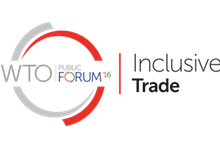Digital trade for development: governance issues and the enabling environment
29 Sep 2016 13:00h - 14:30h
Event report
[Read more session reports and live updates from the 2016 WTO Public Forum.]
The session, organised by the World Bank and the McKinsey Global Institute, focused on two topics: how e-trade reshapes value chains and creates opportunities for developing countries and least developed countries (LDCs) and where e-trade stands on the global governance landscape.
Moderator Anabel Gonzalez, Senior Director of the Global Practice on Trade and Competitiveness at the World Bank Group, opened the session by remarking that the Internet creates new opportunities in the global market and that e-commerce allows small and medium enterprises (SMEs) to reach that global market.
Susan Lund, Partner at McKinsey & Company, talked about the challenges and potential impact of e-commerce on the global trade. She noted that digital constitutes a significant share of the flow of goods, service, and payments. Businesses use online platforms for commerce such as Facebook, Amazon, and Alibaba. Goods such as books, music, and movies have been turned into digital format. Companies such DHL and Maersk deliver these digital goods by adding digital wrappers to raise the value of the offer. The benefits of e-commerce – lower scale cost, higher information signal, efficient secure payments, and fast matching of supply and demand – have created efficiencies and trillions of dollars in e-commerce. She reported that 50 million small businesses use Facebook as a marketing platform, and distribute their products via Amazon and Alibaba.
Hanne Melin, Director of Global Public Policy at eBay, discussed the possible ways for micro firms to connect the world. She highlighted that while e-trade is reshaping global trade for micro firms, issues such as logistics and transportation need to be addressed.
Alfredo Suescum, Ambassador and Permanent Representative of the Republic of Panama to the WTO, talked about how e-commerce began to evolve in the past starting from the Ministerial Declaration on Global Electronic Commerce in 1998 to the Fourteenth Session of the United Nations Conference on Trade and Development 2016. He suggested that the WTO should emphasise infrastructure issues as well as intellectual property.
Michael Ferrantino, Lead Economist and Global Product Specialist for Trade Policy and Integration at the World Bank, addressed how poverty can be reduced though e-trade. He pointed out that China is rapidly growing its share of retail sales, which is resulting in a large number of online shoppers in China. According to Ferrantino, not all products and services can be equally traded, for instance, health care is the least tradable service.
Daniel Crosby, Partner in the International Trade Practice Group at King & Spalding, talked about the application of WTO rules and commitment to e-commerce and the gaps that need to be filled through negotiation and other methods.
Paul Fehlinger, Deputy Director & Co-Founder at Internet & Jurisdiction, discussed challenges regarding jurisdiction. The main problem is the high volume of cross-broader data flow, which should be solved. Other standard issues, such as location of servers and registered domains, should be addressed. He suggested that cooperation between all stakeholders can make it easier for developing countries to access the Internet and the global digital trade market.
At the end of the session, the panellists discussed how the financial payment system is very important to help developing countries in e-trade. It was also said that the potential wide use of block chains in the future will provide creative solutions for people who have access to the Internet, but do not have access to banking services, such as a credit cards.
by Aye Mya Nyein
Related topics
Related event

